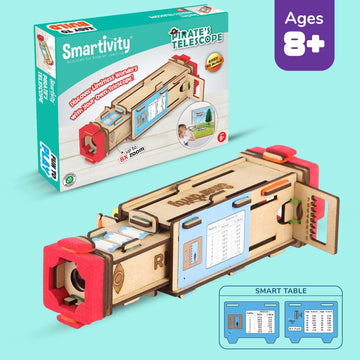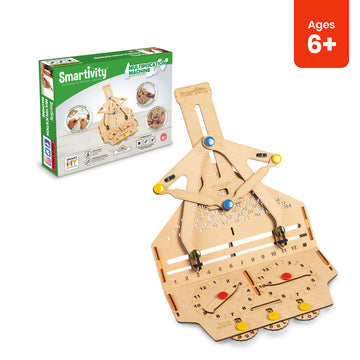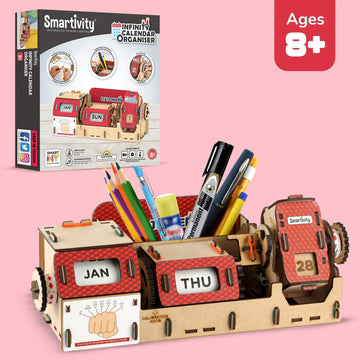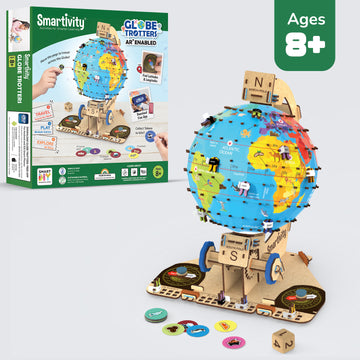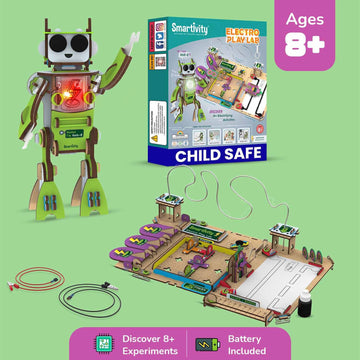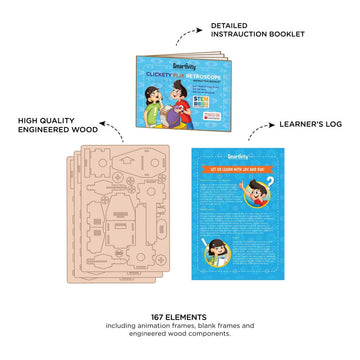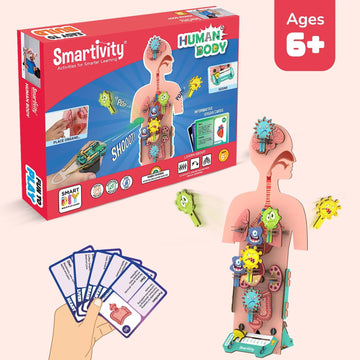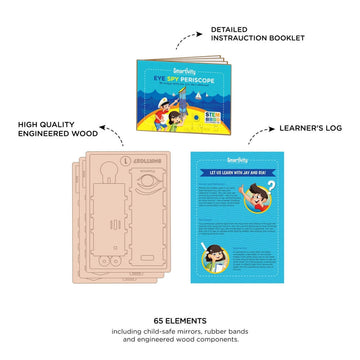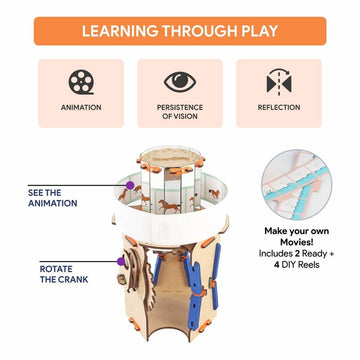12 Moral Values You Must Teach Your Kids - Smartivity Toys
by Smartivity on Fri, Feb 11, 22

"We try so hard to instruct our children in all the right things―teaching good from bad, explaining choices and consequences―when in reality most lessons are learned through observation and experience. Perhaps we'd be better off training our youth to be highly observant.”
- Richelle E. Goodrich
As parents, we often find ourselves thinking about what we need to teach our children, and how. From getting them education in the best schools to getting the right kind of educational toys for them to explore learning with at home, grappling with all of these questions and doubts is stressful, to say the least.
However, along with the right kind of learning, we’re also constantly trying to understand the factors affecting growth and development and the moral values that we need to provide them. Physical growth can be supported by getting them the right amount of exercise, outdoor playtime, indoor playtime with learning toys for kids or educational toys and allowing them to run around freely. However, mental growth is a rather tricky area.
Nurturing a kid’s mental health requires constant effort and training to make their logical quotient stronger. Along with making sure we’re being good parents to our children, we also need to make sure we pass on the right kind of moral values for kids, so they can carry those lessons around for all their lives too! The importance of moral values not only lies in building a person’s character but also in making ethically correct decisions in life.
Although there are many ways in which moral values can help your children, here are some surefire ways in which the right kind of moral education benefits your children.
- It will make them more confident and help them build a more positive character.
- It will help them distinguish better between what’s good and what’s bad.
- It will make them more humble.
- It will set social standards for them that they can adhere to, to live more meaningful lives as adults.
Here are some of the most important moral values that you should teach your children to make sure they grow up to be happy, content, and kind adults.
1. Respect
One of the basic virtues that we teach our children is to respect elders. But what we need to add to this is to teach them how to respect equals as well as their elders, no matter their age, caste, color, creed, or social standing. And this is something that can’t be taught through words, but only through example. So remember to treat everyone around you with respect so your children learn to do the same and follow it through to their adult lives as well.
2. Honesty
Another important moral value for kids that can take your child a long way in their lives is honesty. Saying the truth in all aspects of life takes courage. But, “Honesty is the best policy.” is something that you must teach by being honest to your children about your feelings, about their and your own behavior, and in various situations.
3. Gratitude
A moral value that we also forget to practice sometimes in life is that of gratitude. It’s something we should remember to practice and also teach our children to inculcate in their daily lives. Gratitude for the smallest blessings in life can make them happier, more satisfied individuals. So teaching them gratitude is a good way to bring up healthier, more content adults.
4. Sharing
Sharing is one good value that they will only learn through observing, so practice sharing in front of them when they’re young. Teach them the art of sharing and show them the happiness that comes after sharing. Whether it’s food, stationery, or even the educational toys, show them the joy of sharing resources as well as responsibilities, so that the child learns to take the virtue with them in all of their adult lives as well. Even when they’re learning by games or kids learning toys with their friends or siblings, encourage them to share whatever they have, to show how doing things together with people is much more rewarding than keeping everything to yourself.
5. Empathy
Empathy is one of the good moral values that will go a long way to help your child adjust with other people more naturally. When they learn to empathise with people around them, they will be friendlier, understanding, compassionate and be able to relate well with others, which is also one of the most likable qualities in an adult.
6. Compassion
Compassion or sympathy is an important moral value that comes once your child learns how to empathize with other people. While empathy is the ability to put themselves in another’s shoes, sympathy can help them recognize other people’s misfortunes so they can lend a helping hand to others in times of need.
7. Equality
Equality is something that should be taught especially in this day and age so they don’t learn to discriminate against people based on their gender, class, or caste. To treat all people as equals is one of the values that can help them learn from other people easily and without any hesitation.
8. Acceptance
This is probably one moral value for kids that is already imbibed in the kids, we only need to nurture it as parents. Children are generally more accepting of the way things are (except for when it comes to the toy we refuse to buy them.) But otherwise, they can be taught to be more accepting of what life gives them. This also goes hand in hand with gratitude. To be grateful for how things are, instead of always wishing for something better is one virtue we can all teach our children, and in turn, learn from them in the process as well.
9. Kindness
Kindness is a virtue that could make the world a better place. So it’s always good to teach young minds the art of being kind to all creatures around them. And especially, to treat oneself with kindness. Because that’s the only way they can learn to be kind to others. It’s an underrated virtue but is helpful to bring them up as helpful, trustworthy and self-loving individuals.
10. Self Control
Self-control might not come to mind when thinking of moral values, but in this day and age of abundance, and options to choose from in all areas of life, self-control is a good virtue to teach them young. This will help them stay humble and be able to live a life within their means instead of going overboard or getting involved in the many temptations that our modern life has to offer.
11. Courage
Courage in young children can help them stand up for what’s right for them and for loved ones. This moral value for students and kids can also be best taught by living and showing real-life examples. Kids should be encouraged when they try to show it naturally. For example, if they stand up for injustice done to their best friend or sibling even at home, instead of scolding them, it will be nicer to applaud the act of courage for their loved ones.
12. Perseverance
One moral value that plays a key role in shaping kids’ personalities is perseverance. Perseverance and the determination to achieve their goals and ambitions is something that will help them become their best selves, and in turn, inspire others around them as well.
Moral values should be taught to children at a young age, so they can learn and take those values with them into adulthood. However, it’s true that it’s tough to teach a child to be courageous, or determined, or compassionate or empathetic. The only good way is to teach by example.
Since it’s an already established fact that children learn what they see, it’s best to show them the values you want them to learn by demonstrating them and practicing them in your daily lives as well.
Another way to inculcate good habits and moral values in your children is to narrate your own experiences through stories, or fairy tales to them that could help them relate to, or look up to real people or fictional characters that help them become the best versions of themselves. You should also make sure you always praise and reward good behavior and whenever they display a good moral value in use, practically.
Another way to make sure your children learn the right things is by monitoring their screen time so they don’t end up consuming content that might be bad for them, in terms of learning the wrong kind of behavior, talks, or more.
In conclusion, be sure you communicate the importance of moral values to your children, and continue to practice the same in front of them since the best way you can teach them is by example.








